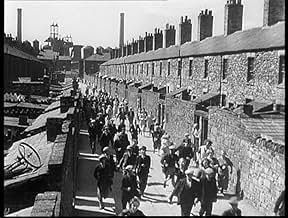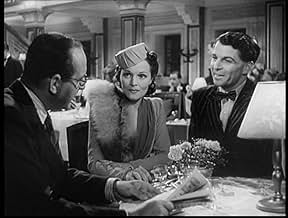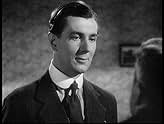In a small coal-mining village, Bob Fenwick leads a strike over safety standards at the local colliery. Meanwhile, his son David goes off to university with the hope one day to return to hel... Read allIn a small coal-mining village, Bob Fenwick leads a strike over safety standards at the local colliery. Meanwhile, his son David goes off to university with the hope one day to return to help the miners with their working conditions.In a small coal-mining village, Bob Fenwick leads a strike over safety standards at the local colliery. Meanwhile, his son David goes off to university with the hope one day to return to help the miners with their working conditions.
- Awards
- 1 win total
- Slogger Gowlan
- (as George Carnay)
Featured reviews
Once you get past the useless introductory speech, this movie begins quite well, portraying a grim world and immediately giving one a feel for the plight of the miners.
For me, a difficulty came with the introduction of Margaret Lockwood's character. I admit there are selfish, empty headed people in the world, but they make for poor film characters. Fortunately it's a fairly small role, but it felt unnecessary to have her at all. She represents a melodramatic streak that unfortunately runs through the movie and lessens the overall impact.
While some parts were problematic, other parts are terrific, such as the mother's stoic attitude as her son goes off to college in which you see her feelings only when no one is looking. And the inevitable disaster is impressively handled.
I also didn't find Michael Redgrave complete believable. I'm not convinced he could develop such an upperclass accent no matter how hard he studied at the local schools.
While worth seeing, this could have been a better movie with a little less melodrama.
It is a political drama about the struggle to control the means of production - no, really. Michael Redgrave and Emlyn Williams play two young men from a dour north-east mining town who escape, separately, to the bright lights of Newcastle. Redgrave's character is a scholarship kid at the university, while Williams plays a spiv who starts out working as a bookie but soon finds other dubious business interests.
They return home for different reasons, and clash over the future of the mine, which the workers suspect is unsafe. It's a surprisingly anti-establishment film for 1940, when Britain was deep into the Second World War, especially given Churchill's famously harsh treatment of striking miners in the 1920s.
It was of particular interest because the novelist, A.J. Cronin actually set the novel near my home town of Ashington in the North East of England, and got it pretty well right as he'd worked as a medic in the area for some years. Interestingly enough, I noticed that many US critics refer to it as being set in a "Welsh" mining village. This may well be because they recognised Emlyn Williams's accent as Welsh and the rest were a pretty mixed bunch - I spotted only one genuine North-East accent! Like all "Socialist Realism" the melodrama was overplayed - nonetheless, there was some truth and accuracy in there and it was fascinating to see how the movie treats coal miners - rightly, in my opinion - as heroic figures.
An unjustly neglected classic.
Did you know
- TriviaSir Carol Reed disowned this movie, calling it "a gloomy little piece". He expected it to be a box-office disaster and was highly surprised when wartime audiences warmed enthusiastically to it.
- Quotes
[first lines]
Richard Barras: Well, Fenwick, will the men work tomorrow?
Robert Fenwick: Not if its to be in Scupper Flats, Mr. Barras.
[indicating a well-dressed union official]
Richard Barras: Even against your union?
Robert Fenwick: The union isn't being asked to work in Scupper Flats. On the other side of that coal seam is a million tons of flood water ready to rush right down on top of us.
Richard Barras: You don't think I'd take a chance in floodin' me own mine, do you, Fenwick?
Robert Fenwick: Well, show us the plans of them old workings, then!
- Alternate versionsThe U.S. release included additional narration spoken by an uncredited Lionel Barrymore.
- ConnectionsFeatured in The Love Goddesses (1965)
- How long is The Stars Look Down?Powered by Alexa
Details
- Release date
- Country of origin
- Language
- Also known as
- Zvezde gledaju sa neba
- Filming locations
- Cumbria, England, UK(Exterior)
- Production company
- See more company credits at IMDbPro
- Runtime
- 1h 50m(110 min)
- Color
- Aspect ratio
- 1.37 : 1




































